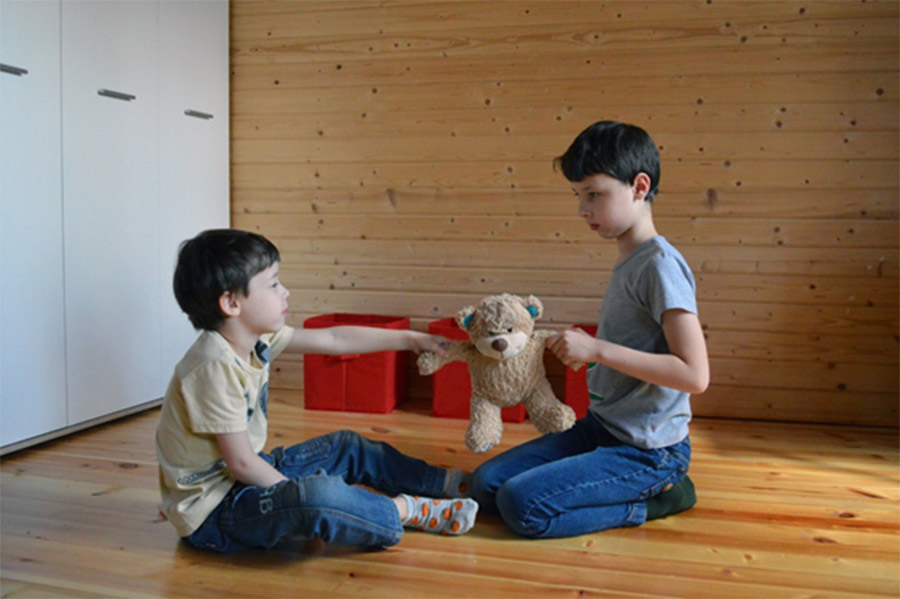
Symptoms of sibling jealousy
Jealousy is a natural emotional response and involves a mixture of emotions that affects the whole family. It usually occurs because one of the children feels displaced in relation to the other(s). We all like to receive attention from others, in fact, it is a very important source of reinforcement and many times we act based on whether we are going to get attention from others or not. Therefore, it is not so strange that when we see that the amount of attention we are used to receiving is in danger, we try to find a solution.
Although it is most common, sibling jealousy does not only occur when a new baby arrives. It can also occur when one of the siblings does something new and gets all the attention, such as starting to talk or walk. They do not necessarily occur from the older sibling towards the younger one but can also occur the other way around or between twins, for different reasons, such as that one gets better grades at school or is better at a sport.
Childhood jealousy can manifest itself in different ways depending on the characteristics of the children: tantrums, hitting the younger sibling, ignoring what the adult says, refusing to share toys, crying, isolation, nightmares or sleep disturbances, regressions to previous stages (for example, returning to thumb sucking or to talking like a younger child), etc. The goal of these symptoms will generally be to attract the attention of the caregivers. We should not forget that all this will also influence the other sibling and the parents, who may feel frustration, sadness, guilt, etc., in the face of their child’s behaviour.
Activities to work on sibling jealousy
A common mistake is to try to prevent child jealousy. Many parents try to pay more attention to the child who is jealous or repress him/her in some way when he/she expresses it. Both options prevent what has already been discussed above as a natural and adaptive response from manifesting itself.
Even so, a better management of this response can be learnt and taught to stop its maintenance over time. Below are some important aspects within general child psychology to better manage child jealousy:
- Teach them to express their emotions in an adaptive way, without yelling and hitting. This will help them to be able to convey to others how they feel and to be able to manage conflicts in a respectful way.
- Let them speak and listen at them empathetically. Many times, they have very important information to say and if we punish and repress them when they express themselves, we will be wasting a magnificent opportunity to know what is happening and how we can manage it. Ask them directly how they feel and why they do what they do.
- When they engage in maladaptive behaviours, such as yelling or hitting, it is essential to remain and act calm. It is important not to get carried away by our emotions, as we will probably experience anger, frustration, guilt… For example, if we give them a reward just to prevent them from acting like that and for feeling better about ourselves, we will be contributing to the problem, because they will learn that when they yell or hit, they get something they like. We should try not to use punishment, and if we do use it, we should use it as a last option. In the article “Punishment and its impact” you can learn more about punishment and its consequences.
- Analyse why he/she is carrying out this maladaptive behaviour. Knowing the reason helps us to better detect their needs and to act in a more appropriate way to the situation. No two children are alike and it is important to try to adapt to the needs of each one. It will not be the same if he hits his brother because he is sleepy or because he thinks we are not paying enough attention to him.
- Reinforce his behaviour when he behaves as we would like and specify very clearly why he is being reinforced. For example: “I like it when you play with your sister quietly and leave her your toys!”
- To motivate this desired behaviour, we can involve him/her in some simple tasks that involve taking care of the little brother/sister, such as helping with the baby’s feeding, but without saturating him/her, and reinforcing him/her for doing so.
- It is very important not to compare between siblings, nor to put labels (for example, the older one is the responsible one and the younger one is the absent-minded one) as this can have an important influence on their self-esteem and generate or maintain jealousy.
- Dedicate exclusive time alone with a certain frequency (without saturating ourselves, as we know that it can be complicated to have moments like this when we have several children) and let them see that they have our full attention. For example, from time to time take advantage of the baby’s nap time to play together for a while, read a story at night or go to the movies alone.
We must keep in mind that it is impossible to be 100% fair and that knowing what each kid needs is a very complex task. That is why it is important that, as parents, we do not demand too much of ourselves and to be aware that we are doing the best we can. For more information, in the article “What to do when my child misbehaves” there is more detailed information on how to deal with maladaptive behaviours in childhood. In case the jealousy is specifically caused by the arrival of a new baby in the family, you can consult the article “Dethroned prince syndrome, the arrival of a new brother“.
What happens when jealousy continues into adolescence or adulthood?
In this situation, jealousy often manifests itself in different ways, such as maintaining a defiant attitude towards one or both parents. In these cases, it is important to analyse what we think may be happening, and what better than to ask them directly? In general, an adolescent or an adult will be able to explain better what is going on. Perhaps we have not realized it and we have compared the siblings in excess, an aspect that we can correct if we have the information.
Keeping all this in mind, each person and situation is different, and it will be important to explore in each case what may be happening. If you think we can help you or your children to overcome this type of jealousy, do not hesitate to contact us so we can assess your case and offer you a more individualized attention.
Aina Fiol Veny
Psychologist Col. Nº B-02615






